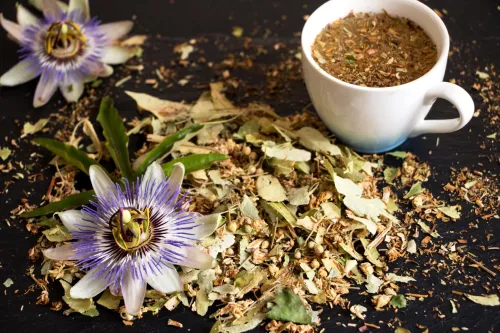Let’s face it—our lives today are more hectic than ever, with work, family, and busy social calendars leaving little time for self-care. Unfortunately, while these responsibilities are part of everyday life, they often come at the expense of our sleep. According to the National Institutes of Health (NIH), between 50 and 70 million Americans have ongoing sleep disorders, and a third of adults don’t consistently get the recommended amount of uninterrupted sleep required for optimal health.
“Unfortunately, we just aren’t built for the 21st century and our ‘always on’ society,” says Mahmud Kara, MD, founder and CEO of KaraMD. “The prevalence of sleep disorders among adults has reached epidemic levels. One approach to solving the problem is to use certain sleep-promoting supplements.”
If a lack of sleep is affecting your life, read on for five natural sleep aids that can help you get some shut-eye and reclaim your health.
RELATED: 12 Best Supplements to Wake Up Feeling Energetic & Fight Fatigue, Experts Say.

More Americans than ever are turning to melatonin to get a good night’s sleep. According to the Sleep Foundation, nearly 30 percent of Americans use melatonin as a sleep aid, and 88 percent of those users report that it helps them fall asleep faster.
“Melatonin is the sleep hormone, meaning it’s one of the most critical for starting the sleep process,” Michael Breus, PhD, clinical psychologist and sleep expert, tells Best Life. “If you have a melatonin deficiency, are experiencing jet lag, or are a shift worker, [supplementing with melatonin] can be quite helpful in keeping your circadian rhythm in sync.”
While there’s no official dosage recommendation for melatonin, the Sleep Foundation recommends taking 0.5 to 5 milligrams one hour before bedtime as a safe and effective method for inducing sleep.
However, it’s important to note that you can overdo it on melatonin or have adverse effects even with the recommended dose. These can include daytime drowsiness, headaches, dizziness, mood swings, stomach aches, worsening sleep troubles, and more.

Magnesium is involved in several critical bodily processes, including regulating muscle and nerve function, balancing blood sugar levels, and managing blood pressure. Magnesium occurs naturally in many foods, such as legumes, whole grains, leafy greens, milk, and yogurt.
This mineral is also found in supplement form and, in recent years, has become a popular sleep aid.
“Magnesium can help you sleep better by calming your body and mind, setting the stage for sleep. It boosts levels of GABA, a chemical in the brain that promotes relaxation and sleepiness,” Shelby Harris, PsyD, DBSM, Director of Sleep Health at Sleepopolis, previously explained to Best Life.
“It also supports the production of melatonin, the hormone that helps control when you feel sleepy or awake and can relax your muscles to prevent cramps or discomfort that could wake you up,” she added.
Cleveland Clinic recommends a magnesium glycinate or magnesium citrate supplement that provides at least 200 milligrams of this essential nutrient. In general, magnesium is safe to take, but it could potentially interfere with some medications or cause stomach upset if you exceed the recommended amount.
If you’re prone to tummy troubles, Kara recommends trying a combined magnesium-calcium supplement: “Magnesium makes people tired and can cause gut spasming, which leads to diarrhea. Take magnesium with calcium—a safe combination—that will resolve your upset stomach.”
RELATED: Research Reveals the No. 1 Supplement to Take After a Bad Night’s Sleep.

Valerian root is a safe and effective herbal sleep aid that’s been used for thousands of years as a natural sedative. Today, valerian root is found in many sleep aid supplements—and it’s easy to see why.
Because this potent herb increases the amount of GABA in the brain, it’s been shown to help you fall asleep faster, increase the time spent getting restorative sleep, and reduce anxiety, according to a meta-review of 60 studies published in the Journal of Evidence-Based Integrative Medicine.
Vanessa Osorio, a sleep health content specialist at Sleepopolis, notes that most people do not experience side effects when taking valerian root. However, she says some users may have “headaches, drowsiness, upset stomach, and dry mouth.”
As for how much and when to take valerian root, the experts at American Family Physician recommend taking 300 to 600 milligrams 30 minutes to two hours before sleep.
“You cannot take this if you are pregnant, breastfeeding, or have liver conditions,” Indhira Ghyssaert, MD, a family physician and nutritionist working with The Balance RehabClinic, recently told Best Life. Valerian root is also known to have negative interactions with melatonin.

Formally known as L-5-Hydroxytryptophan, this amino acid is produced from tryptophan and converts to the neurotransmitter serotonin in the body.
“Serotonin plays several roles in your body, including influencing learning, memory, happiness as well as regulating body temperature, sleep, sexual behavior and hunger,” explains Cleveland Clinic. “Lack of enough serotonin is thought to play a role in depression, anxiety, mania and other health conditions.”
Ninety percent of serotonin is found in your gut—a point highlighted by a recent study published in the journal Clinical Nutrition.
As Best Life explained at the time, “The researchers determined that 5-HTP helped to increase diversity in gut microbiota in those with previously poor sleep patterns. They posit that the improvement in sleep quality could be explained by those improvements in gut health following supplementation with 5-HTP.”
RELATED: 12 Supplements You Should Never Take Together, Medical Experts Say.

A traditional herb that’s been used as a sedative for centuries, passionflower is used for anxiety, pain management, heart rhythm problems, and sleep disorders. The most common method of taking passionflower is in capsule form, or mixed into tea.
“Taking a passionflower supplement 30 to 90 minutes before bed may reduce the amount of time it takes to fall asleep and increase the amount of time you are in deep sleep, also known as slow-wave sleep,” explains Osorio.
The NIH reports that up to 800 milligrams of passionflower can be safely consumed for eight weeks. However, exceeding the recommended amount may cause confusion, mobility issues, and drowsiness.
Talk to your doctor before taking any sleep supplement or natural sleep aid. If your insomnia persists, visit a specialist who can help you get to the root of your sleep problems.
Source link
